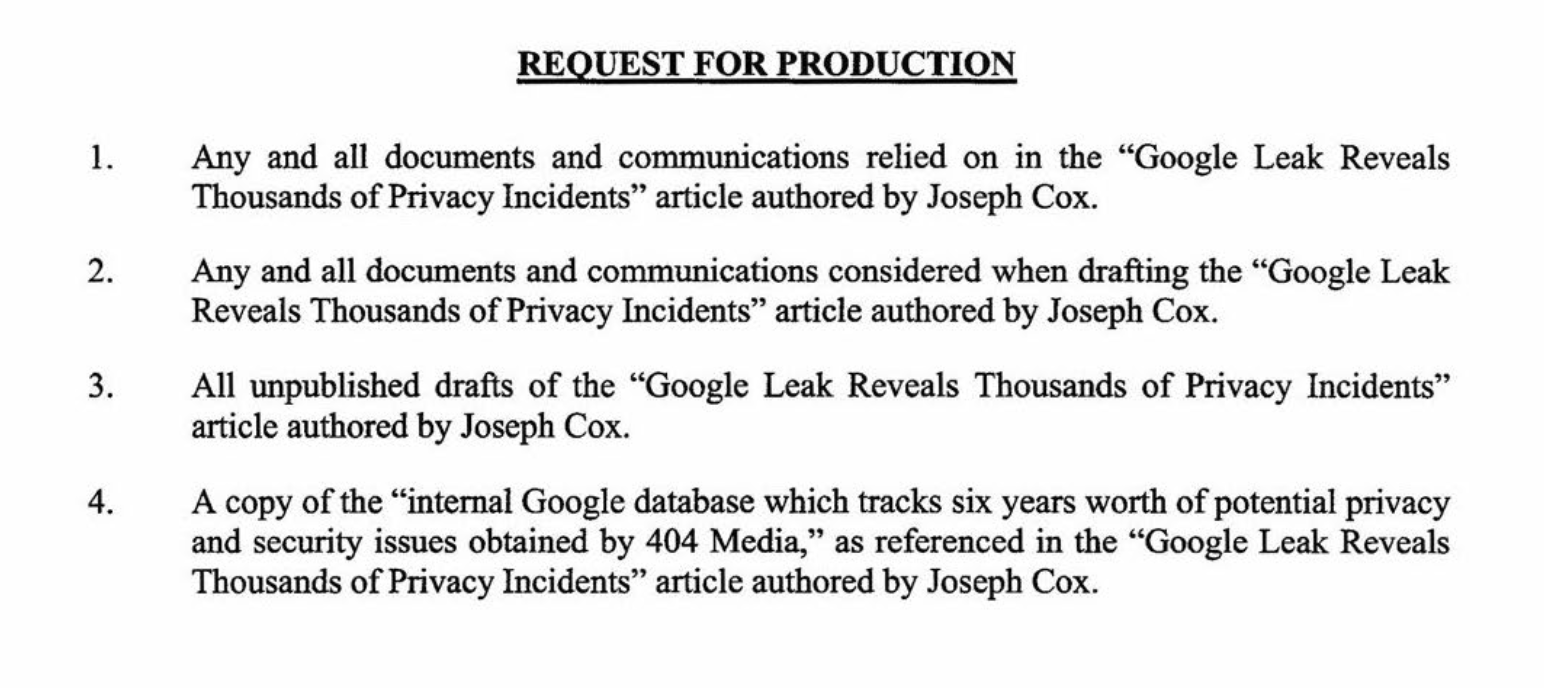In October, Texas Attorney General Ken Paxton subpoenaed 404 Media, demanding that we hand over confidential information about our reporting and an anonymous source to help the state of Texas in a wholly unrelated case it is pursuing against Google. This subpoena undermines the free and independent press. It also highlights the fact that the alarm bells that have been raised about legal attacks on journalists in a second Trump administration are not theoretical; politicians already feel emboldened to use the legal system to target journalists.
Paxton's subpoena seeks to turn 404 Media into an arm of law enforcement, which is not our role and which we have no interest in doing or becoming. And so Friday, our lawyers vociferously objected to Paxton’s subpoena.
Paxton is seeking 404 Media reporting materials and documents related to an internal Google privacy incident database that 404 Media reported on in June. He has demanded these documents as part of a broader lawsuit against Google that claims the company has violated a Texas biometric privacy law that has nothing to do with 404 Media. Specifically, the subpoena demands the following:
“Any and all documents and communications relied on in the ‘Google Leak Reveals Thousands of Privacy Incidents’ article authored by Joseph Cox.
Any and all documents and communications considered when drafting the [article]
All unpublished drafts of the [article]
A copy of the ‘internal Google database which tracks six years worth of potential privacy and security issues obtained by 404 Media.’”
At the time, we did not publish the full database because it contains the personal information of potentially thousands of Google customers and employees, and cannot be reasonably redacted. The subpoena threatens to hold us in contempt of court if we do not comply with its subpoena.

Friday, our lawyers objected to the subpoena on the grounds that it is “oppressive” and because our confidential reporting is protected under the California Shield Law (404 Media is incorporated as Dark Mode LLC in the state of California). “The information and materials sought by the Subpoena are absolutely protected from compelled disclosure by the California Shield Law,” our attorneys wrote. “Dark Mode further objects to the Subpoena on the grounds that it calls for the disclosure of unpublished information that is independently protected from compelled disclosure under the First Amendment to the United States Constitution and Article I, Section 2(a) of the California Constitution.”
Simply put: If Ken Paxton wants Google’s privacy incident database, he should get it directly from Google, not from us.
Shield laws, which are designed to prevent journalists from being compelled to testify in court proceedings or from being compelled to reveal their sources and reporting material, are supposed to protect journalists from frivolous and burdensome fishing expeditions like these. Even if we prevail, it is important for us to explain plainly why Paxton’s subpoena and why legal actions like this pose an existential threat to independent publications like ours, large media organizations, and the very concept of press freedom.
In order to do our job well, journalists need to be independent from the government and from outside corporate interests. It is our job to serve our readers in the public interest, not to serve as a proxy for law enforcement or the state. Our sources—many of whom are particularly vulnerable—share information with us specifically because we are independent from the state. Because of the highly sensitive issues we report on, we sometimes offer our sources the ability to speak to us anonymously, if they have a compelling reason to seek that anonymity (for example, if divulging the information could threaten their livelihood, safety, or freedom). 404 Media uses anonymous sources only when absolutely required, and we verify the information that they provide to us before we publish it.
If we begin divulging our sources to the companies and governments we report on, we can no longer credibly offer vulnerable sources protection and those sources would understandably not trust us and would not be willing to talk to us. And so Paxton’s subpoena not only demands that we serve as an unwilling agent of the State of Texas, but also requires that we sacrifice our own hard-earned credibility to do so. At that point, we are no longer journalists, we are a quasi extension of state or corporate power.
Paxton’s subpoena highlights the urgency of passing the PRESS Act, a federal shield law that has already passed the House and which has bipartisan support but which Democrats in the Senate have dragged their feet on for inexplicable and indefensible reasons. The PRESS Act would prevent the type of frivolous and inappropriate legal action Paxton is pursuing from the federal government, which is particularly important considering that FBI Director nominee Kash Patel has promised to “come after” journalists “criminally or civilly.” Attacking press freedom doesn’t always mean the government will directly sue journalists and news organizations. It can also, as Paxton has chosen to do here, demand information from them in an attempt to embroil them in wholly unrelated and costly legal proceedings, and to hold them in contempt of court when they choose not to commit professional and ethical suicide.
We knew there would be no point to starting 404 Media if we did not do important investigative work that challenges powerful people and corporations and holds power to account. And we knew that doing this type of work necessarily required setting up our company to be prepared to strongly defend ourselves against this type of government overreach and against legal attacks more broadly. Since our founding, we have retained some of the best free speech lawyers in the industry, made sure we are well-informed on the law, and have made sure that our journalism is accurate and legally sound.
As we have mentioned before, making sure that we are buttoned up and protected legally as well as we can be is by far our biggest expense, but it is one that we believe is well worth investing in. If you wish to support our continued work, you can subscribe to 404 Media here. We also accept one-off donations to our tip jar here. We are strongly fighting this subpoena and we will fight any and all legal challenges to our important work.








